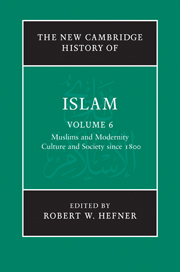Book contents
- Frontmatter
- 1 Introduction: Muslims and modernity: culture and society in an age of contest and plurality
- PART I SOCIAL TRANSFORMATIONS
- PART II RELIGION AND LAW
- 11 Contemporary trends in Muslim legal thought and ideology
- 12 A case comparison: Islamic law and the Saudi and Iranian legal systems
- 13 Beyond dhimmihood: citizenship and human rights
- 14 The ʿulamāʾ: scholarly tradition and new public commentary
- 15 Sufism and neo-Sufism
- PART III POLITICAL AND ECONOMIC THOUGHT
- PART IV CULTURES, ARTS AND LEARNING
- Glossary
- Bibliography
- Index
- References
13 - Beyond dhimmihood: citizenship and human rights
from PART II - RELIGION AND LAW
Published online by Cambridge University Press: 28 March 2011
- Frontmatter
- 1 Introduction: Muslims and modernity: culture and society in an age of contest and plurality
- PART I SOCIAL TRANSFORMATIONS
- PART II RELIGION AND LAW
- 11 Contemporary trends in Muslim legal thought and ideology
- 12 A case comparison: Islamic law and the Saudi and Iranian legal systems
- 13 Beyond dhimmihood: citizenship and human rights
- 14 The ʿulamāʾ: scholarly tradition and new public commentary
- 15 Sufism and neo-Sufism
- PART III POLITICAL AND ECONOMIC THOUGHT
- PART IV CULTURES, ARTS AND LEARNING
- Glossary
- Bibliography
- Index
- References
Summary
Introduction
European colonialism and its aftermath have drastically transformed the basis and nature of political and social organisation within and among ‘territorial states’ where all Muslims live today. This transformation is so profound and deeply entrenched that a return to pre-colonial ideas and systems is simply not an option. Any change or adaptation of the present system can only be sought or realised through the concepts and institutions of this domestic and global post-colonial reality. Yet many Muslims, probably the majority in many countries, have not fully accepted some aspects of this transformation and its consequences. This discrepancy seems to underlie the apparent acceptance of the possibility of an Islamic state that can enact and enforce sharīʿa as such, and ambivalence about politically motivated violence in the name of jihad. This chapter seeks to clarify and redress this discrepancy through an examination of the question of citizenship which has far-reaching implications for political stability, constitutional governance and development at home and international relations abroad. In particular, I will argue for human rights as a framework for highlighting and mediating the tension underlying this discrepancy in present Islamic societies.
- Type
- Chapter
- Information
- The New Cambridge History of Islam , pp. 314 - 334Publisher: Cambridge University PressPrint publication year: 2010
References
- 1
- Cited by



